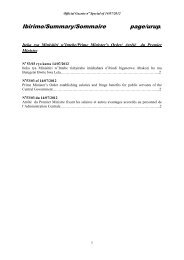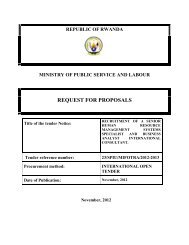MINALOC - Mifotra
MINALOC - Mifotra
MINALOC - Mifotra
Create successful ePaper yourself
Turn your PDF publications into a flip-book with our unique Google optimized e-Paper software.
<strong>MINALOC</strong>, Functional Review draft, 31 March 2008<br />
system for ten months. Each member of staff has their own laptop. At the decentralised level,<br />
<strong>MINALOC</strong> uses the networks of Rwandatel and Artel. These two companies do not cover all<br />
decentralised structures. The budget ceiling of one hundred thousand francs (100,000RWF) allocated for<br />
spending on telephone communications per unit is not sufficient. This amount was fixed by the Cabinet<br />
meeting.<br />
<strong>MINALOC</strong> envisages the implementation of the use of Skype for certain communication options and to<br />
transmit data. The mobile phone has already become an indispensable tool in the accomplishment of<br />
tasks. Its professional use in verbal communication and by SMS has reached a considerable level. In fact,<br />
for any problem that arises at decentralised institution level, famine, flooding, the recent earthquakes,<br />
refugees etc.. <strong>MINALOC</strong> is immediately contactable via mobile phone.<br />
The general feeling is that computerised databases aren’t used enough for the management of information<br />
and for evaluation. The protection of the computer system against non-authorised users and viruses and<br />
other damage is not up to date. This problem could be resolved more broadly across government<br />
institutions to guarantee the alignment of data, archiving and the efficiency of communication systems.<br />
The appropriate use of shared units, protected by intranet passwords with a hierarchy of access rights for<br />
users and the system of electronic depository across government could significantly simplify evaluation<br />
and the establishment of reports as well as facilitating interministerial and interdistrict coordination with<br />
regard to planning, budgeting, saving and sharing of minutes of meetings and records of decisions made.<br />
A.4.5. Links with decentralised bodies and outsourced services<br />
Coordination: Very dynamic coordination structures have been established on a national scale to tackle<br />
the multiplication of approaches and interventions in the decentralisation domain.<br />
The group of decentralisation partners (Decentralisation Cluster) meets every two months. This group<br />
includes technical representatives of the Directors who are responsible for planning within the various<br />
Ministries and Provinces, development partners, civil society representatives as well as CDF and RALGA<br />
as representatives of Local Government.<br />
There is also the Local Government Consultative Forum (LGCF) 23 which is held twice per year. Its<br />
members include Directors with responsibility for planning within Ministries, Provinces and Local<br />
Government.<br />
At the head there is the National Decentralisation Stakeholders Forum(NDSF) 24 which is held once a<br />
year. The NDSF is chaired by the <strong>MINALOC</strong> Minister and represents a platform for a wide range of<br />
stakeholders to review and ensure dialogue is permanently maintained on implementation of the national<br />
decentralisation policy. Development partners contributing to DIP implementation are associate members<br />
of the NDSF.<br />
Although these different coordination structures meet at different intervals (six times, twice and once per<br />
year) as well as apparently different members, they require a better definition of mandates and their work<br />
tools. For some, the composition of members appears identical at certain levels and their functions are<br />
not well enough differentiated. Some proposals are for a reduction in the number of structures to avoid<br />
redundancy and complexity in the process of coordination.<br />
23 In French, Forum Consultatif des Gouvernements Locaux (FCGL)<br />
24 In French, Forum National des Partenaires de la Décentralisation (NDSF)<br />
46


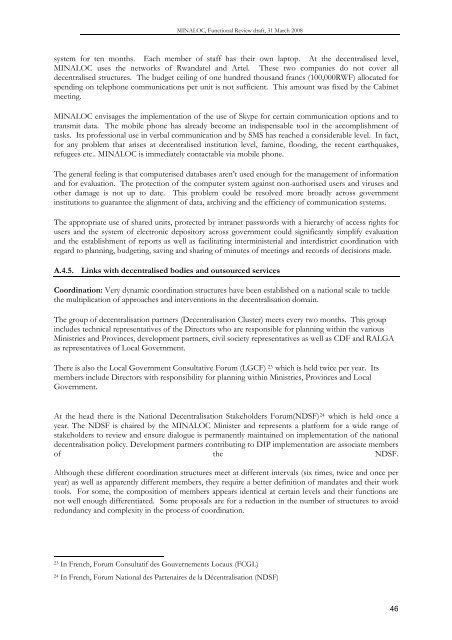

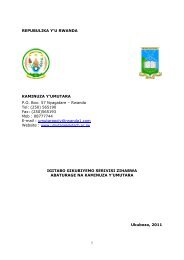
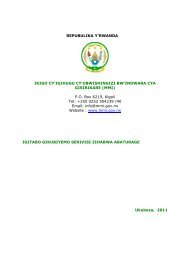
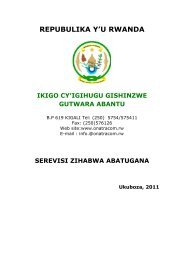
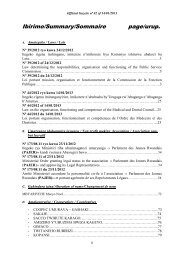
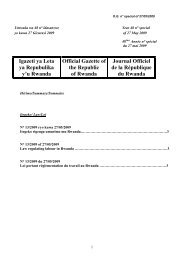
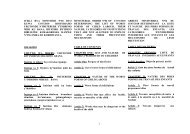
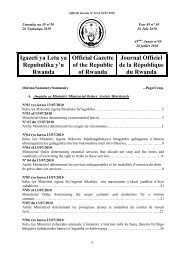
![Official Gazette n°27 of 05[1]. - Mifotra](https://img.yumpu.com/10476421/1/184x260/official-gazette-n27-of-051-mifotra.jpg?quality=85)
